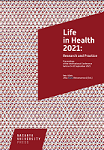The cognitive dimension among university students in the area of sexual and reproductive health with an emphasis on the issue of delayed/late pregnancy and parenthood
The cognitive dimension among university students in the area of sexual and reproductive health with an emphasis on the issue of delayed/late pregnancy and parenthood
Author(s): Michaela Hřivnová, Jitka Slaná Reissmannová, Tereza Sofková, Martina Cichá, Vladislava Marciánová
Subject(s): Higher Education , Cognitive Psychology, Health and medicine and law, Family and social welfare
Published by: Masarykova univerzita nakladatelství
Keywords: Delayed/late pregnancy/motherhood/parenthood; university students; cognitive dimension; sexual and reproductive health;
Summary/Abstract: Background: The shift in women’s fertility and birth rate to the higher age is characterized as the most significant feature of reproductive behaviour over the past decades in the Czech Republic (and in other developed countries). The trend of the so-called delayed or late pregnancy/motherhood/parenthood is determined by polyfactorial influences with possible risk impacts on the biomedical and psychosocial aspects of the health of mothers, fathers, children and society as such. In 2020, the following project was implemented: 50/2020/PPZ/OKD In Time – responsible, erudite, planned and prepared parenthood – The shaping and development of health literacy in the area of reproductive health among young adults (university students). The project was supported by the Ministry of Health of the Czech Republic and the Faculty of Education, Palacký University Olomouc. The outcomes of the project are of both educational and research nature. Method(s): The Research on the cognitive and affective dimensions of young adults in the area of early pregnancy/parenthood involving a sample of 844 student respondents from 14 universities in the Czech Republic evaluated the level of knowledge of health literacy with an emphasis on the general area of sexual and reproductive health as well as the specific area of possible risks associated with delayed/late pregnancy/parenthood. The research also focused on the personality and attitude dimensions of young adults in the context of delayed and late pregnancy. Results: In a specific area of sexual and reproductive health, the level of knowledge was problematic, sometimes even insufficient. An alarming fact is the complete lack of knowledge concerning the probability of conception during a single ovulation cycle of a young woman (18–30 years). Surprisingly, the correct answer was identified by less than 2% of female university students. The complete set of results of the research is published in the monograph In Time: The cognitive and affective dimensions of young adults in relation to pregnancy and parenthood. Conclusions: The unfavourable level of health literacy concerning early pregnancy/parenthood may have a negative effect on the affective and behavioural dimension of young adults and support the manifestations of possible bio-psycho-social risks and complications resulting from the trends of shifting motherhood/parenthood to higher age bands. It is thus necessary to educate the young generation by means of adequate didactic procedures in order for them to be able to make informed decisions about whether and when to have a child.
Book: Life in Health 2021: Research and Practice
- Page Range: 63-75
- Page Count: 13
- Publication Year: 2021
- Language: English
- Content File-PDF

